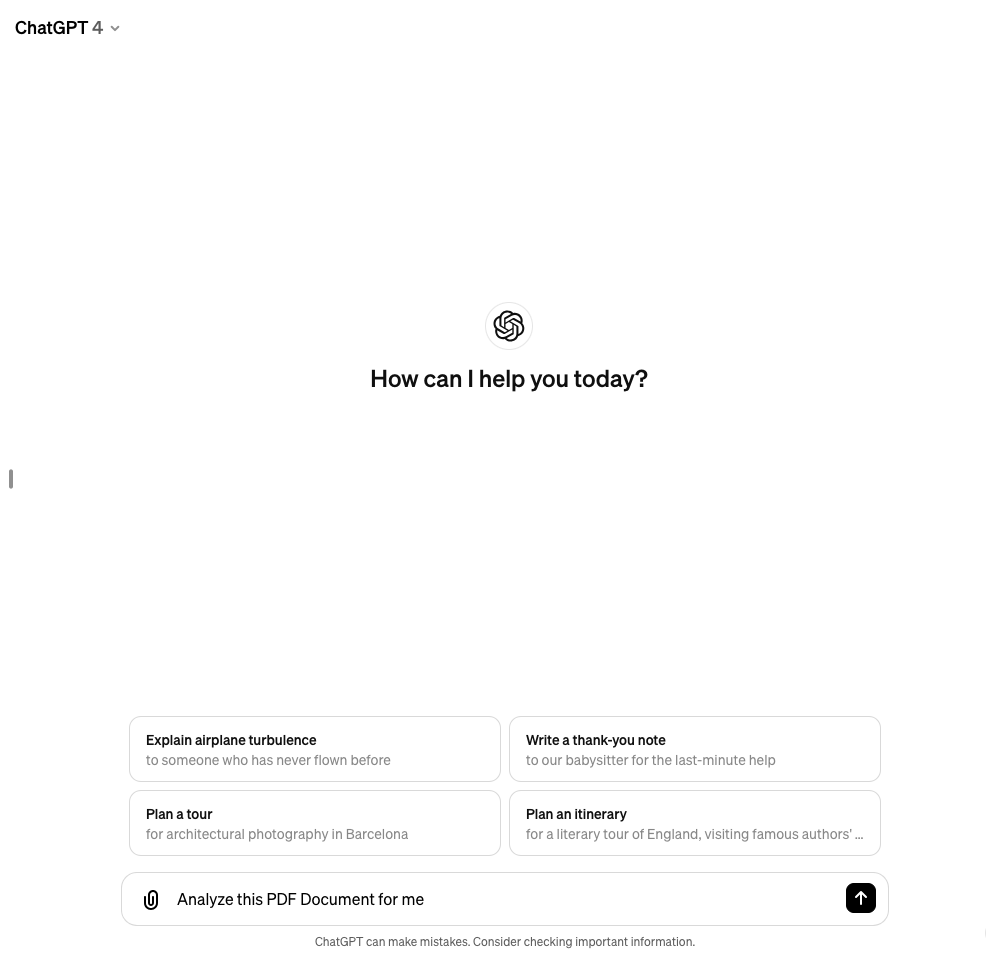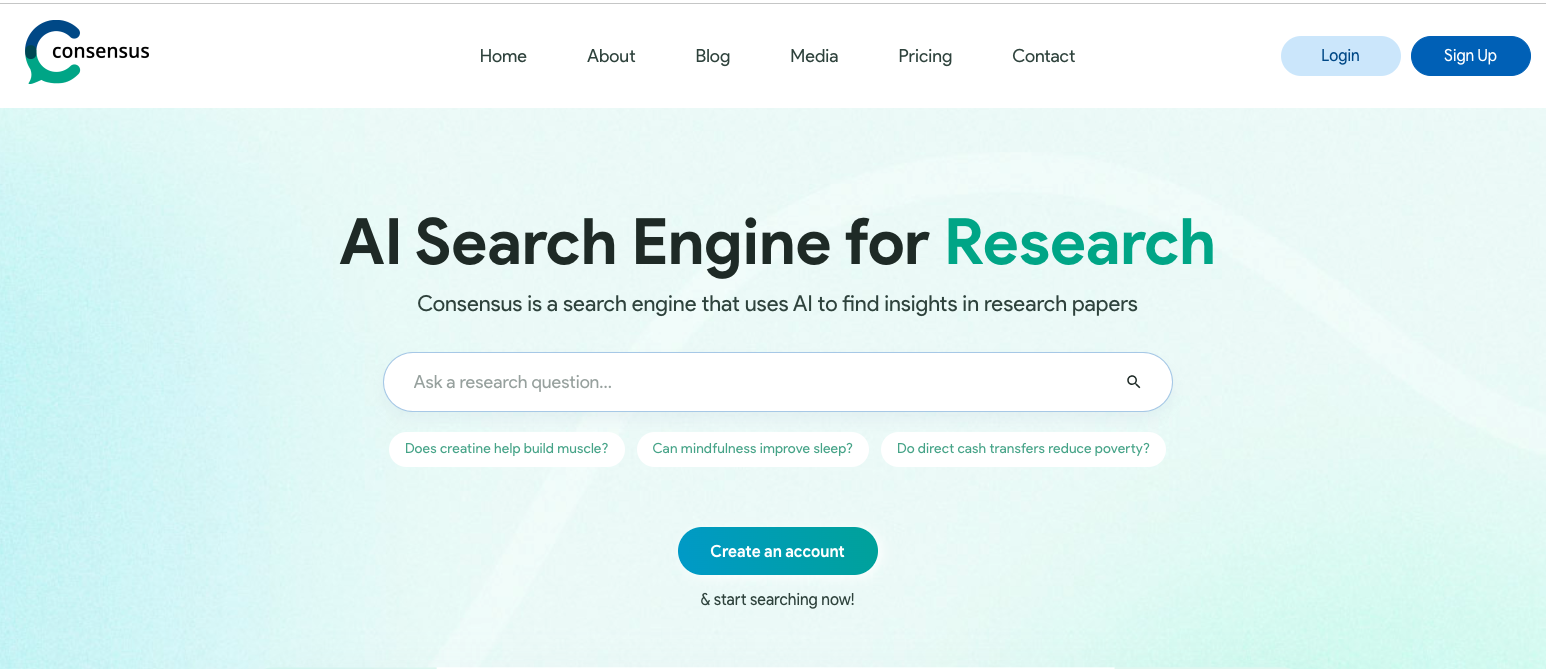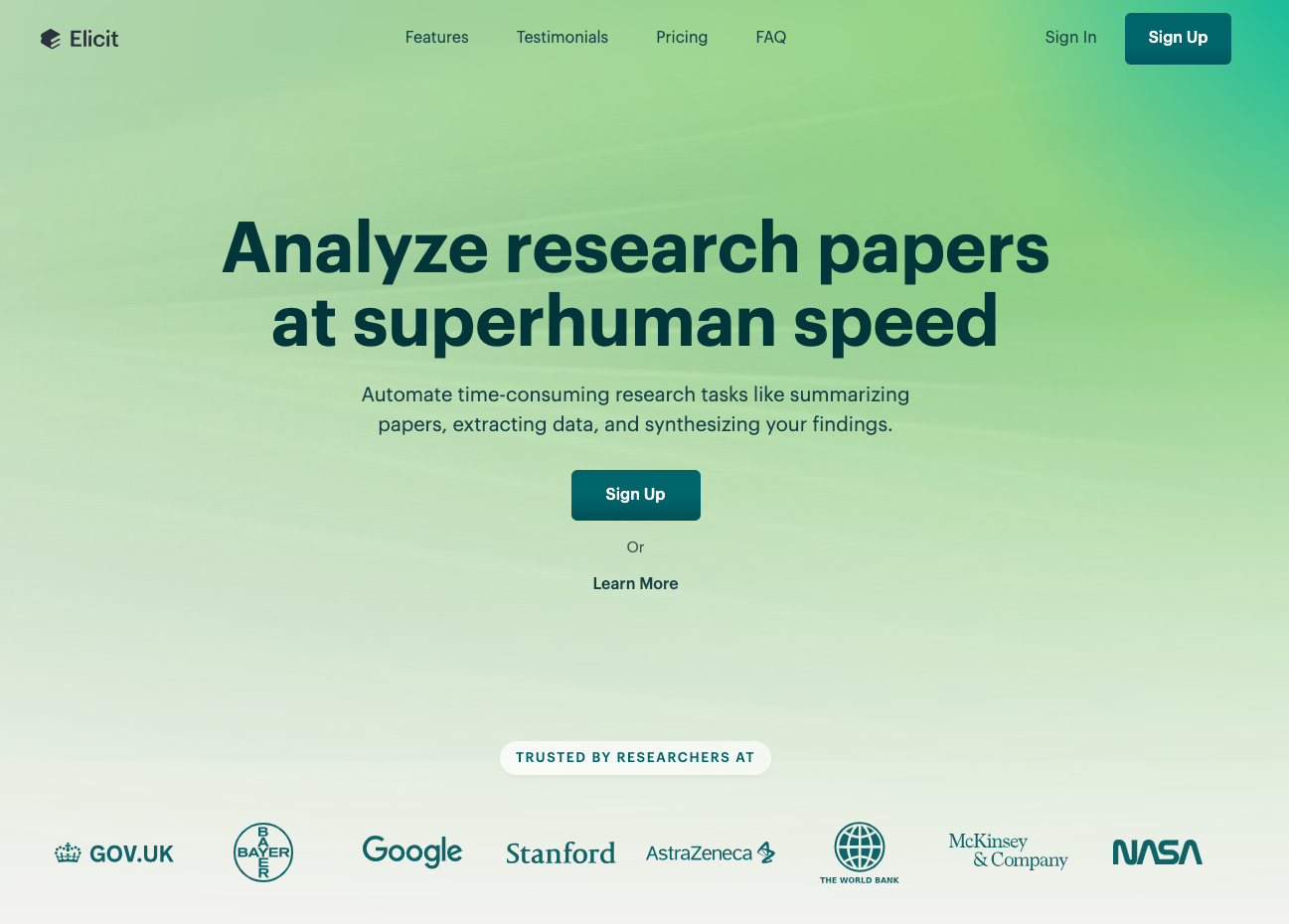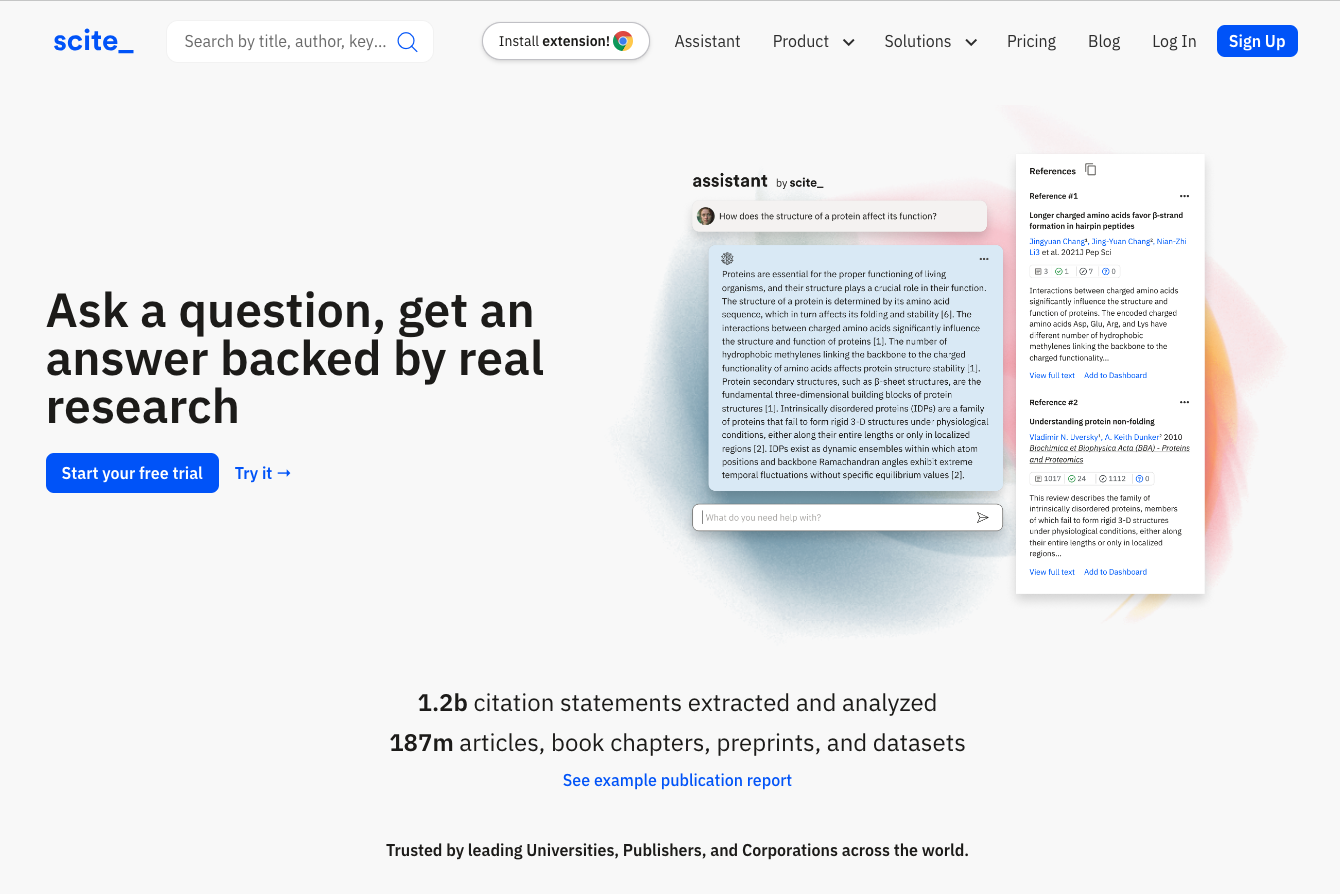
Introduction
Academic research, once a tedious process involving hours spent in libraries and manual data collection, is now increasingly digitized. Technological advancements have made this critical aspect of knowledge generation more efficient and accessible.
One visionary who foresaw this transformation is Bill Gates. Known for his insightful predictions, Gates anticipated that AI-driven software would revolutionize education and academia within a span of 5-10 years. And true to his words, we are witnessing a surge in the use of AI writing tools for academic research.
These AI tools are not just augmenting traditional research methods but are reshaping them altogether. They offer a myriad of benefits like accelerating the pace of research, enhancing accuracy, and democratizing access to academic resources.
In this article, we have compiled a list of the top AI writing tools for academic research. These tools employ natural language processing algorithms to assist researchers in various aspects of the research process, including:
- Generating ideas and outlining papers
- Finding relevant sources
- Proofreading and editing
Best AI Tools For Research: Our Top Picks
| Ranking | Top AI Tool For Research | Highlight |
|---|---|---|
| 1 | Junia AI | Leading tool with citation generator feature, supports APA, MLA, Chicago styles. Enhances time efficiency, accuracy, ease of use, versatility in source formats. |
| 2 | ChatGPT | OpenAI language model for text generation tasks. Used at Stanford University for brainstorming ideas and structuring outlines. Versatile document handling (web browsing, PDFs). |
| 3 | Consensus | Specialized search engine for academics. Summarizes peer-reviewed articles into easy-to-understand summaries using AI algorithms. Efficient information retrieval during literature review stage. |
| 4 | Elicit.org | Comprehensive literature reviews and data extraction from various sources. Identifies main ideas without reading entire text and establishes relationships between concepts across documents. |
| 5 | Scite.ai | Analyzes citation patterns in scholarly articles to assess impact/credibility of papers. Categorizes citations as supporting/mentioning/disputing original paper's claims/findings. |
| 6 | Research Rabbit | Web app for scientific literature exploration/understanding. Creates organized collections of relevant papers using advanced algorithms analyzing content/metadata (keywords/abstracts/citation networks). |
| 7 | Google Scholar | Extensive online repository of scholarly literature across disciplines. Uses AI algorithms to rank documents by relevance and tracks citations to measure impact. |
| 8 | Trinka | Improves academic papers' quality by providing feedback on sentence structure, vocabulary usage, overall coherence. |
thout reading entire text and establishes relationships between concepts across documents. | | 5 | Scite.ai | Analyzes citation patterns in scholarly articles to assess impact/credibility of papers. Categorizes citations as supporting/mentioning/disputing original paper's claims/findings. | | 6 | Research Rabbit | Web app for scientific literature exploration/understanding. Creates organized collections of relevant papers using advanced algorithms analyzing content/metadata (keywords/abstracts/citation networks). | | 7 | Google Scholar | Extensive online repository of scholarly literature across disciplines. Uses AI algorithms to rank documents by relevance and tracks citations to measure impact. | | 8 | Trinka | Improves academic papers' quality by providing feedback on sentence structure, vocabulary usage, overall coherence. |
1. Junia AI
.png?token=eyJhbGciOiJIUzI1NiIsInR5cCI6IkpXVCJ9.eyJ1cmwiOiJ1c2VyLWdlbmVyYXRlZC1pbWFnZXMvZjJmOThkNWUtNjNjNC00MTJiLTkyY2QtZjgyNDI5NTE3YWRkL1NjcmVlbnNob3QgMjAyMy0xMi0xNiBhdCAyMi4yMi40MCAoMSkucG5nIiwiaWF0IjoxNzA5OTM1NzUyLCJleHAiOjIwMjUyOTU3NTJ9.mwSsgMw94c8_U1XaTjDalxtKua8hNbQscZGif0iyTAE)
Junia AI is a leading AI writing tool for academic research, and its citation generator feature is one of its standout offerings. With Junia AI, citing research sources becomes a breeze, saving you time and effort. Let's take a closer look at what makes Junia AI the go-to citation tool for researchers and academicians.
How Junia AI Works
Junia AI utilizes advanced algorithms to simplify the citation process. It has access to a vast database of sources, which allows it to generate accurate citations in various styles such as APA, MLA, and Chicago. Here's how it works:
- Input Source Details: You provide the necessary information about your source, such as author name, publication title, year of publication, etc.
- Select Citation Style: You choose the desired citation style from the available options.
- Generate Citations: Junia AI applies its algorithms to create citations based on the provided details and selected style.
Key Benefits of Using Junia AI
Using Junia AI for your citation needs offers several advantages that can enhance your research process:
1. Time Efficiency
Manually citing sources and formatting reference lists can be time-consuming, especially when dealing with multiple styles. With Junia AI, you can save valuable time by letting the tool handle these tasks for you.
2. Accuracy
Correctly citing your sources is crucial in academic writing as it adds credibility to your work and prevents plagiarism issues. Junia AI's advanced algorithms ensure that your citations are precise and consistent with the chosen style.
3. Ease of Use
Despite its sophisticated features, Junia AI remains user-friendly. Its intuitive interface makes it easy to enter source details, and its ability to generate citations instantly is a boon for researchers working under tight deadlines.
4. Versatility
Whether you're citing a book, a scholarly journal, a website, or any other type of source, Junia AI has got you covered. It supports a wide range of source formats, making it a versatile tool for all your citation requirements.
While Junia AI offers significant benefits for academic writing, it's worth noting that there are other AI-driven tools available to assist you throughout your research journey.
2. ChatGPT

ChatGPT, developed by OpenAI, is an essential tool for academic research. This language model is specifically designed for generating text, making it a valuable assistant for scholars and researchers.
The Power of Incremental Prompting
The key feature of ChatGPT that resonates with academia is its incremental prompting feature. Incremental prompting allows researchers to create detailed outlines for their journal articles or research papers. With this feature, you can provide the model with a series of related prompts one by one, and it will respond accordingly. This step-by-step approach leads to more coherent and detailed responses.
This capability not only simplifies the writing process but also makes it more structured and organized. It's like having an intelligent assistant that helps you arrange your thoughts and ideas into well-defined sections or chapters of the research document.
Versatility in Document Handling
One of the strengths of ChatGPT lies in its ability to work with different types of documents. It can browse the web, interact with files (including PDFs and other formats), making it convenient for users to access various sources during their research work.
This ability is particularly useful when dealing with large PDF files or complex documents where finding relevant information can be challenging. With ChatGPT, you can simply upload your file, ask specific questions about its content, and get precise answers instead of having to read through the entire document.
Case Study: Stanford University
Let's look at an example from Stanford University where ChatGPT was tested by students and professors. They used this AI tool as part of their academic writing process - from generating ideas to creating outlines for journal articles.
- In one instance, a PhD student working on a paper about AI ethics used ChatGPT to generate an outline for his document. He started with a broad prompt on AI ethics which yielded a general response from the model. He then gradually added more specific prompts, leading the model to generate a detailed and organized outline of the paper.
- In another case, a professor at Stanford used ChatGPT for preparing his lectures. He would prompt the model with a topic he planned to teach and based on the generated responses, he would create an outline for his lecture.
These real-life examples demonstrate the effectiveness of ChatGPT in academic writing. It's not just about easing the writing process but also enhancing it by providing a new way to structure your thoughts, ideas, and findings. As Bill Gates predicted, AI-driven software like ChatGPT is indeed revolutionizing education and academia.
From these examples and many more, it is clear that using an AI tool like ChatGPT can significantly improve the academic writing process. By providing structure to your work, generating ideas, and making information retrieval easier, such tools are proving to be game-changers in academic research.
3. Consensus

Consensus is a specialized search engine designed for academics, leveraging advanced Artificial Intelligence to provide accurate and concise summaries of peer-reviewed articles.
How Consensus Works
The power of Consensus lies in its AI algorithms, which analyze the content of papers to extract key information. This makes it more than just a regular search engine - it's a tool that can distill complex academic papers into easy-to-understand summaries.
Why Choose Consensus?
When it comes to finding relevant sources for your research, Consensus offers several advantages over traditional search engines:
Features of Consensus
- Summarized Evidence: Consensus provides summarized evidence from peer-reviewed literature, allowing you to quickly grasp the main points of a paper without reading the entire document.
- AI-Powered Search Engine: Unlike keyword-based search engines, Consensus understands the context and relevance of your query, delivering more precise results.
- User-Friendly Interface: With its simple yet efficient interface, Consensus makes it easy for you to navigate the platform and find what you need.
Benefits of Using Consensus
Using Consensus during the literature review stage of your academic research projects can bring several benefits:
- Efficient Information Retrieval: By providing concise summaries of peer-reviewed articles, Consensus helps you save time during the literature review process.
- Access to Quality Sources: As Consensus focuses on peer-reviewed literature, using it ensures that you're accessing reliable and academically sound sources.
- Time-Saving: Thanks to its AI-powered search engine, Consensus delivers relevant results quickly, allowing you to work more efficiently.
- Improved Understanding: The summarized evidence provided by Consensus can enhance your understanding of the topic at hand, making your research more comprehensive.
- Ease of Use: With its user-friendly interface and straightforward functionality, Consensus is a tool that seamlessly integrates into your academic writing workflow.
Consensus serves as an example of how AI can transform the way academic research is conducted. As we embrace the digital age, tools like Consensus are becoming essential for researchers in various fields. By harnessing the power of AI, Consensus paves the way for more efficient and effective academic research, allowing you to focus on what truly matters - creating impactful knowledge.
4. Elicit.org

Elicit.org is an AI-powered tool designed to streamline the research process by assisting in conducting comprehensive literature reviews and extracting relevant data from various sources. It is one of the top AI writing tools for academic research that has been embraced by researchers worldwide.
How Elicit.org Works
The power of Elicit lies in its sophisticated algorithms that analyze the content of documents. These algorithms are capable of identifying key concepts, relationships, and findings within a sea of information. This feature allows users to gain valuable insights for their own research projects in a fraction of the time it would take manually.
Key Features of Elicit.org
Identifying Key Concepts
Elicit's AI is programmed to identify and highlight key concepts within a text. This gives you an immediate grasp of the main ideas within a document without having to read it in its entirety.
Establishing Relationships
Another significant feature of Elicit.org is its ability to establish relationships between different documents or concepts. This helps to build a comprehensive understanding of the subject matter.
Extracting Findings
Finally, it can extract critical findings from research papers, providing you with specific data points that may be relevant to your research.
The practical applications of these features are numerous. For instance, if you were conducting a literature review on climate change, Elicit.org could:
- Analyze hundreds of papers
- Identify the key concepts such as 'global warming', 'carbon emissions', 'deforestation', etc.
- Establish relationships between these concepts across different papers
- Extract critical data points like specific carbon emission figures.
Try Elicit.org for Your Research
Elicit.org has truly revolutionized the way researchers approach literature review and data extraction, making it a crucial AI tool for academic research. By integrating Elicit.org into your research workflow, you can leverage its AI capabilities to make your research process more efficient and effective.
5. Scite.ai

Scite.ai, a unique platform that stands out in its approach to enhancing the credibility of research.
Beyond Traditional Citation Tools
Scite.ai is not just a citation tool; it uses artificial intelligence to analyze citation patterns in scholarly articles meticulously. This insightful analysis offers users contextual information about how particular studies have been cited by other researchers. It's like having an intelligent assistant who can tell you not just who is citing your work, but also how and why they are citing it.
How Does Scite.ai Enhance Research Validation?
The primary focus of Scite.ai is on research validation. This is where the tool truly shines. In simple terms, Scite.ai helps scholars assess the impact and credibility of published papers more effectively. Its underlying AI technology sifts through the multitude of citations associated with any article, cutting through the noise to provide meaningful insights. It uses these insights to determine whether a paper has been positively or negatively received, based on the context within which it has been cited in subsequent works.
But how does this work?
Scite.ai takes each citation and breaks it down into three categories:
- Supporting: The citing work provides evidence in favor of the assertions made in the original paper.
- Mentioning: The citing work refers to the original paper but does not explicitly support or dispute its content.
- Disputing: The citing work challenges or contradicts the findings or claims made in the original paper.
This categorization gives a clear snapshot of how other researchers view your study, which can be invaluable when assessing its impact and validity.
Benefits of Using Scite.ai for Academic Writing
Incorporating Scite.ai into your academic writing process comes with several potential benefits:
- Strengthening Arguments: Knowing how others perceive your references can help you build stronger arguments by choosing sources that have been widely accepted and supported.
- Supporting Claims: Scite.ai gives you an edge by letting you back up your claims with references that have been positively cited in other works.
- Enhancing Credibility: A paper that includes well-regarded sources increases its credibility in the academic community, potentially leading to more citations and higher impact.
Understanding the Context of Citations
Scite.ai's approach to assessing the impact of papers does not stop at categorization. It also provides a 'citation statement', which is a brief excerpt from the citing text. This allows users to understand the context and rationale of the citation without having to read through the entire citing article.
For example, if a researcher is writing about climate change and selects a paper as a reference, Scite.ai not only shows how many times the paper has been cited but also provides an overview of whether these citations are supporting, mentioning or disputing it. This information paints a more in-depth and detailed picture of how the chosen paper has been received by the scientific community.
The Power of Scite.ai for Scholars
In essence, Scite.ai is a powerful ally for any scholar. It provides unique insights into citation patterns, enabling users to make informed decisions about which sources to use and how to present their arguments effectively. The ability to validate research, bolster arguments, and enhance credibility makes Scite.ai an indispensable tool in today's digital age where academic integrity is paramount.
6. Research Rabbit
Research Rabbit is an innovative AI tool designed to assist with exploring and understanding scientific literature. It's a web application that helps researchers navigate through scientific literature, enabling them to create organized collections of pertinent papers.
Utilizing advanced algorithms, Research Rabbit analyzes both content and metadata of articles. The analysis allows the application to suggest related works, providing researchers with new perspectives and connections they might have overlooked.
How Does Research Rabbit Work?
Research Rabbit employs AI algorithms to scrutinize the content and metadata of articles. This process includes evaluating keywords, abstracts, author affiliations, citation networks, and even figures and tables within the paper. This comprehensive approach provides a deeper understanding of the article's context and relevance.
The system then recommends other relevant articles based on its analysis. This feature aids researchers in uncovering new links between studies and gaining interdisciplinary insights.
Benefits of Using Research Rabbit
The use of Research Rabbit can bring multiple benefits to both novice and experienced researchers:
- Keeping Up With Latest Developments: The rapid pace at which new research papers are published makes it challenging for researchers to stay updated. Research Rabbit addresses this issue by providing recommendations based on recent publications related to their chosen topics.
- Identifying Research Gaps: By reviewing related papers suggested by Research Rabbit, researchers can identify gaps in current knowledge and thereby find opportunities for novel research.
- Improving Efficiency: Instead of manually searching for relevant studies, researchers can rely on Research Rabbit's AI-powered suggestions, saving valuable time.
- Enhancing Understanding: By presenting different perspectives on a topic through related works, Research Rabbit fosters a more comprehensive understanding of the subject matter.
To illustrate this process, consider a researcher studying climate change's impact on agriculture. After inputting their research papers into Research Rabbit, the application might suggest articles about innovative farming practices in response to climate change or economic studies on how climate change affects agricultural markets. These suggestions can lead the researcher to consider new angles for their work, promoting a more nuanced and complete analysis.
Research Rabbit represents a significant advancement in AI writing tools for academic research. Its ability to analyze literature and suggest related works enables researchers to delve deeper into their topics, discover new perspectives, and stay abreast of the latest developments in their field. By harnessing this technology, researchers can enhance the depth and breadth of their studies while improving their productivity.
7. Google Scholar
Google Scholar, a well-known platform for academic research, is an extensive online collection of scholarly literature across various fields. It has become an essential tool in the academic world because of its vast collection of research articles, conference papers, theses, books, and patents from professional societies, online repositories, universities, and other scholarly organizations.
Google Scholar uses advanced AI algorithms to rank documents based on their relevance, considering factors such as the full text of each document, where it was published, who authored it, and how frequently and recently it has been cited in other literature. As a result, researchers can access a wide range of scholarly content that might not be available through other search engines.
Finding Relevant Sources with Google Scholar
When doing academic research, the challenge often lies not in finding information but in finding relevant information. By using Google Scholar's advanced search features effectively, you can overcome this challenge.
General Search
Simply enter your keywords into the search bar for a list of relevant resources.
Advanced Search
Click on the menu icon on the top left of the page and select "Advanced Search" for more specific queries. You can:
- Search for exact phrases
- Exclude certain words
- Search within specific publications or authors
Author Verification
If you're searching for articles from a particular author, make sure that they have verified their Google Scholar profile to avoid confusion with authors having similar names.
Tracking Citations: Measure Your Impact
One of the unique features of Google Scholar is its citation tracking capability. This feature allows researchers to measure the impact and influence of their work within the academic community.
Cited By
This link under each result shows how many times an article has been cited by other papers indexed on Google Scholar. It's a helpful indicator of an article's influence or importance in a field.
Google Scholar Citations
This feature lets authors track citations to their articles. You can check who is citing your publications, graph citations over time, and compute several citation metrics.
Tips and Strategies: Maximizing Google Scholar's Effectiveness
The value derived from Google Scholar largely depends on how effectively you use its features. Here are some strategies to enhance your academic writing endeavors:
- Refine Your Search: Use boolean operators like AND, OR, NOT, "", and - to narrow or broaden your search.
- Personalized Updates: Set up alerts for new content that matches your specified criteria (such as author or keyword). This helps you stay updated with the latest research in your field of interest.
- Export Citations: Google Scholar allows you to export citations in various formats (like BibTeX, EndNote, RefMan, or RefWorks) which can be directly imported into your reference management software.
Google Scholar is considered one of the most powerful academic search engines available. Its comprehensive database coupled with advanced AI algorithms makes it an invaluable tool for academic research. By understanding its features and learning how to leverage them effectively, you can streamline your academic writing process and produce well-researched scholarly work.
8. Trinka
Trinka is an advanced writing assistant powered by AI that aims to improve the quality of academic papers. It provides researchers with valuable feedback and suggestions to refine their writing style and eliminate grammatical errors.
How Does Trinka Help Improve Your Writing?
Trinka uses advanced algorithms to analyze your text thoroughly, focusing on three main areas:
1. Sentence Structure
Trinka examines each sentence in your paper for clarity, coherence, and conciseness. It suggests revisions to make your writing easier to understand.
2. Vocabulary Usage
The tool identifies complex or inappropriate words in your writing and suggests simpler alternatives.
3. Overall Coherence
Trinka evaluates the logical flow of ideas and arguments throughout your paper, highlighting areas that may need further explanation or reorganization.
By addressing these aspects, Trinka helps you create a well-written academic paper with a strong foundation.
"Trinka is more than just a grammar-checking tool. It is a smart companion that understands the nuances of academic writing and can assist you in producing high-quality papers.
The Power of AI Writing Tools for Academic Research
With the rapid advancements in technology, an important shift has taken place in the academic research arena. The emergence of AI writing tools for academic research has become a game-changer, improving both efficiency and quality in research efforts. These tools offer a wide range of capabilities that can help at every stage of the academic writing process.
Adapting to Technological Advancements
The world of academia is changing quickly. Researchers now need to keep up not only with developments in their own fields but also with broader technological trends that could affect their work. This includes embracing advancements like AI, which can greatly enhance research endeavors.
One example of this is Scite.ai. This platform uses AI to analyze citation patterns in scholarly articles, giving users contextual information about how a particular study has been cited by other researchers. This approach to research validation can help scholars better understand the impact and reliability of published papers. By using such tools, researchers can strengthen their arguments and support claims with trustworthy references, thereby improving the credibility of their work.
Experimenting with AI Tools
Innovation is key in academic research. That's why it's crucial for researchers to constantly explore and experiment with new methods and technologies that can enhance their work. This includes trying out various AI writing tools mentioned in this article.
For instance, you might want to consider using Research Rabbit for exploring scientific literature and creating organized collections of relevant papers. Its algorithms analyze the content and metadata of articles to suggest related works, enabling you to discover new connections and interdisciplinary perspectives. Such tools not only streamline your literature review process but also inspire new research directions.
The Future is Here
These AI writing tools are not just about keeping up with technological advancements; they are about embracing the future of academic research. As researchers, it's important for us to adapt and evolve alongside these changes, integrating technology into our workflows to improve efficiency and enhance the quality of our work.
